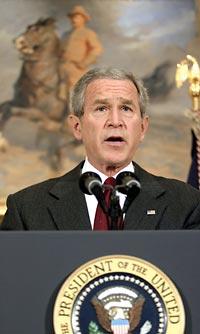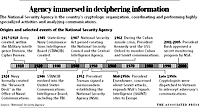Bush comes out swinging for spying program

WASHINGTON — President Bush said Saturday that he secretly ordered the National Security Agency (NSA) to eavesdrop on Americans with suspected ties to terrorists because it was "critical to saving American lives" and "consistent with U.S. law and the Constitution."
Bush said the program has been reviewed regularly by the nation's top legal authorities and targets only those people with "a clear link to these terrorist networks." Noting the failures to detect hijackers already in the country before the strikes on New York and the Pentagon, Bush said the NSA's domestic spying since then has helped thwart other attacks.
In his statement, during a live and unusually long radio address, the president assailed the news media for disclosing the eavesdropping program and rebuked Senate Democrats for blocking renewal of 16 key provisions of the USA Patriot Act set to expire Dec. 31.
"The terrorist threat to our country will not expire in two weeks," said Bush, calling a filibuster by Democratic senators opposed to the Patriot Act, which gave the FBI greater surveillance power after 9/11, "irresponsible."
Democrats hit back Saturday, saying Bush's aggressive use of domestic spying must be curbed by Congress and courts to protect civil liberties. "There is going to be no breakthrough" in the Senate impasse, said Minority Leader Harry Reid, D-Nev., adding that "the act as written is bad, and we need time to work it out."
Sen. Patrick Leahy of Vermont, the Judiciary Committee's top Democrat, said of Bush's speech: "Fear-mongering and false choices do little to advance either the security or liberty of Americans."
Bush's speech represented a turnaround for a White House that initially refused to discuss the highly classified NSA effort even after it was revealed in news accounts. Advisers said Bush decided to confirm the program's existence — and combine that with a demand for reauthorization of the Patriot Act — to put critics on the defensive by framing it as a matter of national security, not civil liberties.
"A vital tool"
The NSA "authorization is a vital tool in our war against the terrorists," Bush said. "It is critical to saving American lives. The American people expect me to do everything in my power under our laws and Constitution to protect them and their civil liberties."
Congressional Democrats and some Republicans have expressed outrage at the NSA program, saying it contradicts long-standing restrictions on domestic spying and subverts constitutional guarantees against unwarranted invasions of privacy.
Some were further incensed by Bush's remarks Saturday. "The president believes that he has the power to override the laws that Congress has passed," said Sen. Russell Feingold, D-Wis. "He is a president, not a king."
Rep. Dan Burton of Indiana was among Republicans responding. "The liberal media and its liberal allies are attacking the president" for spying tactics that are legitimate and legal, he said on the House floor. "The fact is, the president is defending the United States of America."
What was authorized
The order signed by Bush, reported by The New York Times on Thursday, empowered the NSA to monitor international telephone calls and e-mail of U.S. citizens and residents without the warrant normally required by a secret foreign-intelligence court.
A high-ranking intelligence official said Saturday that the presidential directive was issued in October 2001, not in 2002, as other sources have claimed. And Saturday, Bush said his directive came "weeks" after 9/11. The high-ranking official would not say whether the authority was changed or broadened significantly in 2002 or later during regular reviews.
Hundreds and perhaps thousands of people have been subjected to the surveillance, government officials said. Officials have privately credited the eavesdropping with the apprehension of Iyman Faris, a truck driver who pleaded guilty in 2003 to planning to blow up the Brooklyn Bridge. Bush said other plots also were disrupted.
"The activities I have authorized make it more likely that killers like these 9/11 hijackers will be identified and located in time," he said.
Regular reviews
Bush said the program is reviewed every 45 days by the attorney general and White House counsel and that he must then reauthorize it to keep it active. He said he has reauthorized it more than 30 times "and I intend to do so for as long as our nation faces a continuing threat from al-Qaida and related groups."
The president also said the administration has briefed key members of Congress on the program a dozen times. Classified programs are typically disclosed to the chairpeople and ranking minority members of the House and Senate intelligence committees.
House Minority Leader Nancy Pelosi, D-Calif., said she had been told on several occasions that Bush had authorized unspecified activities by the NSA, the nation's largest spy agency. She said she had expressed strong concerns at the time, and Bush's statement Saturday "raises serious questions as to what the activities were and whether the activities were lawful."
Bush justified his order on the basis of his presidential powers as commander in chief and his interpretation of the congressional resolution authorizing him to use force in response to the Sept. 11 attacks. But Bush did not explain his constitutional thinking, or how the 2001 resolution gave him the authority to order domestic spying.
Retired Adm. Bobby Inman, who led the NSA from 1977 to 1981, said Bush's authorization of the eavesdropping would have been justified in the immediate aftermath of the Sept. 11 attacks "because at that point you couldn't get a court warrant unless you could show probable cause."
"Once the Patriot Act was in place, I am puzzled what was the need to continue outside the court," Inman added. But he said, "If the fact is valid that Congress was notified, there will be no consequences."
The NSA surveillance and the Patriot Act debate are the latest chapters in a growing political struggle over the contours of the administration's tactics against terrorism. Thursday, Sen. John McCain, R-Ariz., forced Bush to accept a new law explicitly outlawing the use of cruel, inhuman and degrading treatment of prisoners. Several senators are pressing the administration to provide information on secret CIA detention facilities overseas.
The president criticized the media for reporting the NSA surveillance and the officials who "improperly" provided the information. "As a result, our enemies have learned information they should not have, and the unauthorized disclosure of this effort damages our national security and puts our citizens at risk," he said.
Post writers Chuck Babington and Barton Gellman contributed to this report. Material from The Associated Press also is included.

Bush speech tonight
President Bush will address the nation about Iraq at 6 p.m. The White House said it was asking television networks for live coverage.